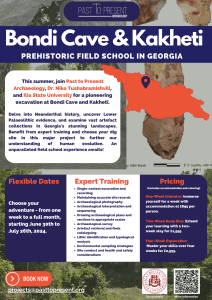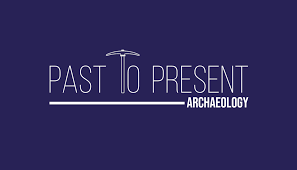
The Past to Present Archaeology Group is hosting a summer field school at Bondi Cave in Georgia. Bondi Cave is a Palaeolithic cave located in the basin of the Rioni-Kvirila Rivers, in the Imereti region in north-western Georgia, and is one of few cave sites which documents the transition between the Middle to Upper Palaeolithic, cataloguing the demise of the Neanderthals and their replacement by Homo sapiens between 45 and 35 ka BP. To date, the cave has only received limited attention with the excavation of a single trench recording deposits back to the Later Middle Palaeolithic. The Caucasus possesses numerous examples of similiar sites that contain much older artefacts and deposits such as Tsona and Kudaro in Georgia, and Azykh in Azerbaijan. Therefore, it is hypothesised that Bondi Cave may date further back in time to the Lower Palaeolithic.
Situated 10km south west of Bondi Cave, lies an open plateau that following a programme of test-pitting in 2021 has produced numerous Lower and Middle Palaeolithic artefacts including Levallois cores, flakes, tools and handaxes. The area of recovery is quite extensive and possesses multiple outcrops of good quality volcanic raw materials. The site has the potential to be extremely rich, which will be extremely important for helping archaeologists understand how hominins exploited and occupied this fascinating landscape.
This summer, Past to Present Archaeology alongside Dr Niko Tushabramishvili and Ilia State University, Tbilisi, Georgia, launch a new research initiative to undertake excavations at both Bondi Cave and Kakheti open site to expand on previous excavations, to explore and document Neanderthal evolutionary history, discover evidence for the Lower Palaeolithic and study extensive artefact bearing deposits in a beautiful open landscape. This is an exciting fieldschool opportunity to excavate rich Palaeolithic deposits and contribute to the understanding of human evolution in the Caucasus. Participants have a choice of site and even have an opportunity to receive expert archaeological training by industry professionals.
Students will learn:
- Single-context excavation and recording
- Maintaining accurate site records
- Archaeological photography
- Archaeological interpretation and sequencing
- Drawing archaeological plans and sections to appropriate scales
- Archaeological survey
- Artefact retrieval and finds cataloguing
- Lithic identification and typological analysis
- Environmental sampling strategies
- Site conduct and health and safety considerations
Students may choose to be a part of the the project for one to four weeks, allowing the field school to be financially flexible. For more information on how to join this field season, follow this link.





